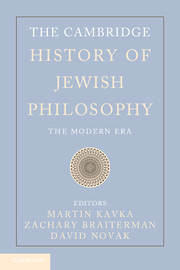Book contents
- Frontmatter
- Contents
- Contributors
- Acknowledgement
- Introduction
- I Judaism's Encounter with Modernity
- II Retrieving Tradition
- III Modern Jewish Philosophical Theology
- 10 God: Divine Transcendence
- 11 God: Divine Immanence
- 12 Creation
- 13 Revelation
- 14 Redemption
- 15 Providence: Agencies of Redemption
- IV Jewish Peoplehood
- V Issues in Modern Jewish Philosophy
- Bibliography
- Index
10 - God: Divine Transcendence
from III - Modern Jewish Philosophical Theology
Published online by Cambridge University Press: 28 September 2012
- Frontmatter
- Contents
- Contributors
- Acknowledgement
- Introduction
- I Judaism's Encounter with Modernity
- II Retrieving Tradition
- III Modern Jewish Philosophical Theology
- 10 God: Divine Transcendence
- 11 God: Divine Immanence
- 12 Creation
- 13 Revelation
- 14 Redemption
- 15 Providence: Agencies of Redemption
- IV Jewish Peoplehood
- V Issues in Modern Jewish Philosophy
- Bibliography
- Index
Summary
The idea of divine transcendence – that on a literal level God is completely beyond human conceptual and emotional reach – appears very early in the history of Jewish tradition. The Bible's continuing preoccupation with God's radical oneness can be taken as insinuating that God's oneness is incomparable – and therefore literally indecipherable. The rabbis developed multiple strategies for grappling with God's overwhelming, unbridgeable transcendence and of charting its human uses and applications on varying metaphoric levels. One could say that liberating the human energies encapsulated in the idea of divine transcendence becomes a continuing project of Jewish self-exploration from the Talmudic period to Jacques Derrida and beyond. In this chapter, I focus on one central rabbinic text – the beraita of R. Pinchas b. Yair – as both theoretically incorporating within itself multiple strategies for translating the metaphor of divine transcendence into the theological and sociological reality of Jewish tradition, and historically serving as a textual conduit through which these translations were actually achieved. In my reading of it, the beraita of R. Pinchas b. Yair enshrines how some of the most radical impulses in Judaism are articulated and transmitted through the medium of conservative recovery of textual mappings of our relationship to the Supremely Unknown and Unknowable.
- Type
- Chapter
- Information
- The Cambridge History of Jewish PhilosophyThe Modern Era, pp. 309 - 336Publisher: Cambridge University PressPrint publication year: 2012



